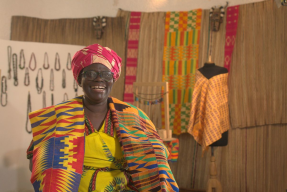The Evolution of Economy: A New Definition of “Rich”
May 3, 2012The evolution of the global economy is fascinating. The definition of a “rich country” has changed significantly throughout the centuries. I was having lunch the other day with a Canadian friend, and she was comparing the good aspects of Honduras and Canada. She pointed out Honduras’ cheerful environment, paradisiac beaches and fresh food, especially fruit.
Here in Honduras, I can buy 30 bananas for 50 cents. Can I do that in Canada? No. This is because of the abundance of tropical fruit grown in Honduras.

Every time I went out to the countryside I bought one of this and shared it with everyone in the office. Price 1 USD
Centuries ago, countries like Honduras were considered “rich” based on their natural resources, central location, the quality and fertility of their soils, steady weather and available water sources. In this context, Honduras is very very rich! Now though, that definition of rich has become outdated.
Today, countries like Honduras –rich in the old definition but poor by current standards –play a secondary role in the world’s economy. The current economy does not value these formerly desired characteristics as much as it used to. In some cases, the market even punishes national economies based on primary products, raw materials and agricultural goods. This reality has generated initiatives like fair trade around the world.
Honduras is this rich:
And they have to live like this:
At some point in the natural evolution of the economy these countries stagnated, while others moved forward with technology, information and manufactured goods. Causes of this stagnancy include corruption, weak democracies, weak institutions, low quality education and crime or conflict.
Probably the most awful reality is that these countries have to live with the junk that ”richer” countries produce. The high consumption economy of the United States generates huge amounts of used goods every day, products that are seen as junk or garbage there. I have asked myself for years, what happen to all the cars and products that get too old for North American standards? Where do those millions of cars go? Well now I know. All the public transportation (urban and rural) in Honduras is covered by used American school buses. Those yellow old buses are now used as public transportation here. Most of them still have the names of the American schools where they were used.
There is a law in Honduras that allows people to import used cars. Accordingly, most people buy crashed or very old American cars for a small amount of money. You can imagine the current condition of these buses and cars. They are not safe, clean or comfortable at all. The amount that has to be spent in repairs is huge, but the small initial price is persuasive.
What seems like a practical short-term solution is catastrophic for national pride, transportation safety and the future of the country. How can a society evolve when it lives in the shadow of the U.S.? How is possible for these people to be treated as equals when they are surrounded by others’ junk? We can’t stop looking for a better and sustainable option, because what is clear is that emerging countries have to dream BIG!
Santiago Cortes is a Kiva fellow living and working in Honduras. He works most closely with Prisma Honduras, but is also helping the Orginizacion de Desarollo Empresarial Femenino (ODEF), another MFI in the country.
PREVIOUS ARTICLE
Passport Series: Lending to help social good take root in Viet Nam →NEXT ARTICLE
Students gathered, fundraised, and discussed poverty for Month of Microfinance →
























